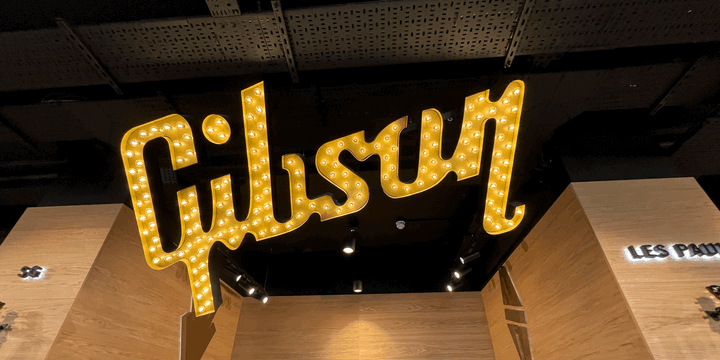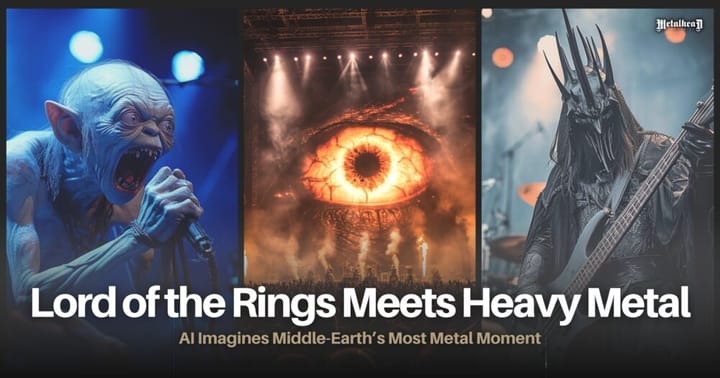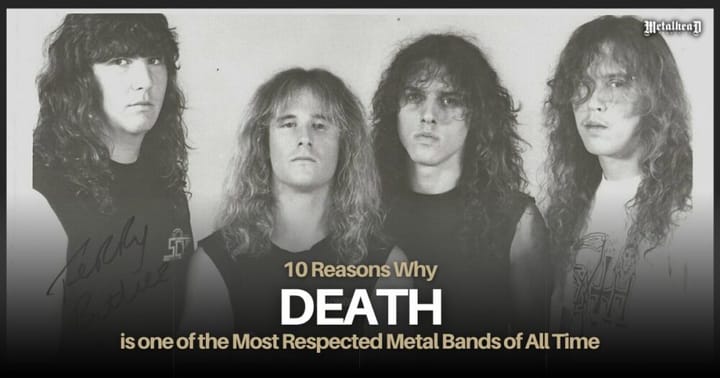A Giant Metal Robot There to Serenade You in Our Shows, Not Something You See Every Day, Says Professor B. Miller of Satanic Puppeteer Orchestra
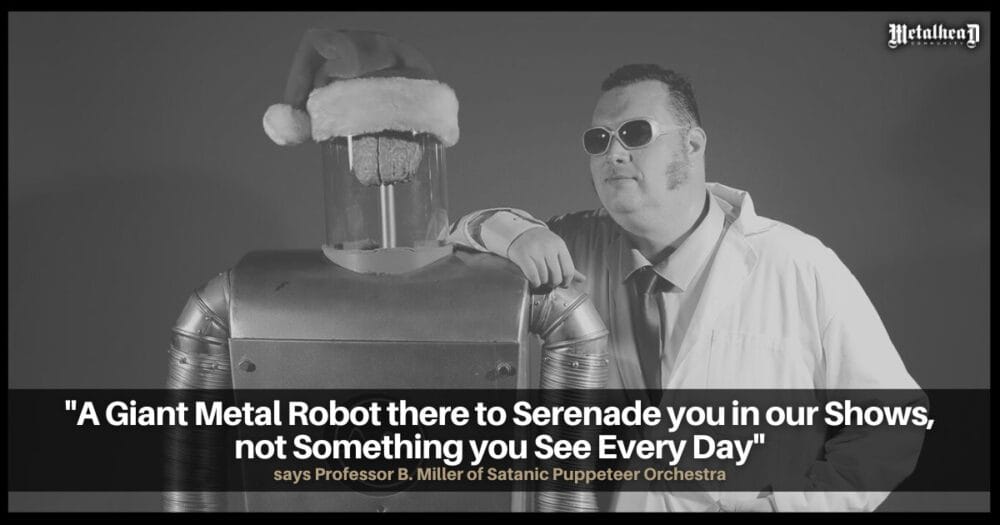
We often forget the fact that every single piece of music out there is someone's creation who most likely put more thought and effort into it than others. Some of these art forms immediately resonate with us for an unexplainable reason, and some make sense over time. While everyone is debating over "whether using backing tracks in live music is cheating" or "what separates noise from music" nowadays, discovering a metal band with robot vocals was indeed a strange coincidence from my side, which opened a new perspective in my life after hearing its story.
Satanic Puppeteer Orchestra was the first metal band I ever heard with robot vocals, although I remember hearing such vocal style with "robotic effect" by Daft Punk but never as the main vocalist of the project before. It was Professor B. Miller, one of the originators of this idea answered my questions about Satanic Puppeteer Orchestra, their motivation, influences, perspective, feedback, future plans, and being an independent artist in 2022.
Satanic Puppeteer Orchestra, Anti-Intellectualism (Official Music Video)
Q1 - How would you describe a regular day for Professor B. Miller? What is the percentage of making music in your daily life?
A1 – I’m not a full-time musician, so very little of my life is spent making music. Usually about three hours a week. But knowing that, we come prepared and focused to make the most out of the time we do get.
Q2 - Do you listen to music with robotic vocals?
A2 – I wouldn’t say it’s something I listen to regularly. Part of that reason might be simply because there isn’t a lot of it out there. We’re doing our best to fix that.
Q3 - How was Satanic Puppeteer Orchestra was born? And what does it mean to you?
A3 – This project has been going for over 25 years at this point. It started when I stumbled across some text-to-speech software in the late 1900s and wondered what it would be like to create music with that robot voice singing.
My background is in writing and art, so for me, Satanic Puppeteer Orchestra is this big umbrella that lets me continuously create new things… lyrics, songs, stories behind the songs, events, videos, art, and tie them all together. Instead of writing a novel with a finite ending, the band is this living work of multi-layered fiction that can just expand endlessly. We’re interested in technology, existentialism, satire, absurdity, marketing, performance art, subverting expectations, and questioning the world around us. If there’s an unwritten rule in music, we probably broke it.
What does it mean to me? It’s my way of staying sane, my creative outlet. It’s how I make sense of the world, and helps me find like-minded people.
Q4 - How did you come up with combining robotic vocals with metal music, and why was it a good idea?
A4 – Is metal ever a bad idea? Growing up in the 80s, it was hard not to get drawn into metal. Metal was the first genre of music I was really obsessed with. I’ve always loved metal. But it’s an intimidating genre to tackle, especially if you don’t have the right guitar player for it.
Our band is unique, beyond having robot vocals, because we don’t stick with one genre. I think that goes back to my time as music director at my college radio station. On one hand, I was exposed to everything and found something to love in just about every genre I came across. On the other hand, when you listen to a few hundred new bands every week, a lot of it starts to sound the same. So that pushed me to do something both sonically and thematically that was wildly different from everything else out there.
As we set out to record 20 themed albums, the plan from the beginning was to explore as many genres as possible and give them our own spin. We brought in a guest guitar player, Matt Rodriguez, for our nautical record. He was in a band called Beta Factor with Nick Buchmiller who has written and performed on all of our records. They were sort of like Iron Maiden meets Kraftwerk. Anyways, as Matt was warming up, he was practicing some crazy metal riffs. I asked if he’d be down to work on a whole metal album with us, and that’s the moment our metal album started. Matt recorded on a couple tracks, and eventually we connected with our current guitar player, Scott Schramp, who helped us see it through to the end.
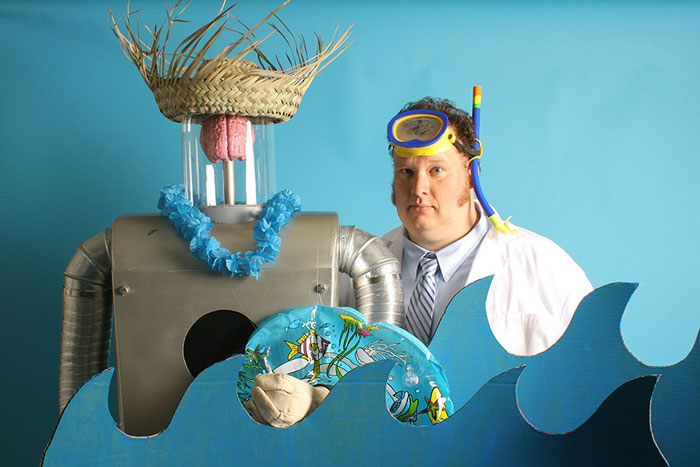
Q5 - How much time did it take you to write and record 20 full-length studio albums? And what do you make of this achievement?
A5 – We aren’t quite there yet. Our debut album was a 4 CD Box set back in 2007, so obviously audacious goals aren’t new to us. We put out a follow up album in 2014, but started on the series of 20 themed albums in 2018. This metal album, “Face Their Fears,” is themed album number 8. We have numbers 9 and 10 done, and those will be coming out next year. It takes a while to press vinyl records these days.
Themed album #9 is called “Surf the Web” and is an album about the internet backed with surf and garage rock. We got Scott who played most of the metal guitar to keep hanging out with us and roped him into another guitar-centric album.
Album #10 is the halfway point, so it’s a pretty epic milestone. It’s called “Have an Existential Crisis.” If you know one thing about our band, it’s that we have a robot singer. So in addition to the songs being about the meaning of life, parallel universes, alternate timelines, and existence in general, the vinyl has parallel grooves. Listeners will drop the needle, and not have control over which reality they are about to enter. One in which a robot sings our songs, or one where guest vocalists sing them. Guest vocalists that include Spencer Moody (Murder City Devils, M.Krebs), Pall Jenkins (Black Heart Procession, Three Mile Pilot, Mr. Tube and the Flying Objects), Jacob Turnbloom (Mrs. Magician), Pat Beers (the Schizophonics), Elena Fox (PLRLS, Candy Smokes, Concrete City), Marie Haddad (Baby Bushka, Super Buffet), and Sean Tejaratchi (Graphic artists and writer, Crap Hound, Social Justice Kittens, LiarTownUSA).
It’ll take a few more years for us to finish all 20 themed albums, but we are well on our way.
As for what it means, I’m not one for spending a lot of time dwelling on the past or focusing on the destination. It’s about the journey, and looking ahead at what’s next. I can’t wait until next Monday when we meet up to start working on another new song. I’m excited about figuring out some of the wild details going into our next couple of releases. By the time I get to 20 albums, we’ll have some new dream we are chasing down.
So why declare we are working on 20 albums in the first place? What a fun and absurd thing to get to tell people. Who does that? I mean aside from us, of course. Plus I think it helps keep the pressure on. Releasing this metal album last week wasn’t the finish line. It’s no time to slow down. Having specific themes also helps spark ideas and give some guardrails to the creative process.
Big, public goals like that are also great for getting people’s attention. I spent years telling people we were working on a debut 4 CD Box Set, and I think most people thought I was joking. Those same people now realize when I say we are doing 20 themed albums, I’m 100% serious.
Q6 - How is the feedback so far after your latest album, Face Their Fears?
A6 – I think we caught people by surprise. There aren’t a lot of clues in our discography up to this point that we are fans of metal, so this one probably seems like it came out of nowhere. I wasn’t sure how well it would be received by the metal community, but so far the response has been positive. There’s elements of what we do that are poking fun at some aspects of metal, like the included corpse paint face stencil that comes inside copies of the 12” vinyl, but people seem to understand that it’s coming from a place of appreciation and love.
Q7 - What were the main influences in Face Their Fears album, subject wise and musically?
A7 – All of the topics on the album revolve around the central concept of fear. What are people afraid of? Are those the things they should be afraid of? The world we live in is terrifying these days, and this album is our way of trying to process that. Sometimes we take an exaggerated view of the situation to play up the absurdity of it, but underneath that initial layer we’re getting at something bigger.
Musically, we tried to touch on various sub-genres of metal. I don’t know when we’ll get back to making another metal album, so I wanted to make sure we covered as much ground as we could. Classic heavy metal, thrash metal, desert metal, symphonic black metal, metalcore… there’s a variety of styles in there.
Q8 - What would be the three things that make this collective special, in your opinion?
A8 – First, we have a robot for a singer. There’s no sense in trying to dance around that one. When you come to our show, there’s a 6’ 4” giant metal robot there to serenade you. It’s just not something you see every day.
Second, we treat satire and humor as an art form. Humor is pretty rare in music to begin with. People take it so seriously. As soon as something is funny, people write it off as frivolous. We try to write songs with enough layers and substance that you can keep coming back. I think humor in high art is generally lacking, but people seem to appreciate and acknowledge our deadpan Dadaism. We are actually taught at San Diego State University as experimental fiction alongside writers like Kurt Vonnegut and Robert Louis Stevenson, which I think speaks to the fact that there is a depth to our approach to humor.
Third, our themed vinyl releases are works of art. The lyrics and music all adapt to whatever that album’s theme is, and I like to think we find unique spins on those topics. And some of the themes themselves are unusual. Our first themed record was all about the grocery store, for instance. Next, there are elaborate liner notes with each themed release. We find experts on the topic to help set the stage for what we are doing. Our outer space record? We got an astrophysicist. Ice cream record? Food historian. The cover art is done by Derek Yaniger, and he’s one of my favorite artists around. They are instantly suitable for framing and look so cool together as a series. The vinyl itself is clear with songs on one side, and elaborate laser etchings on the flip side. Then each release comes with a piece of ephemera that ties in with the theme. The nautical record? A sheet of temporary sailor tattoos. Our financial album? Two custom minted coins and a huge stack of purple dollar bills. Sure, you can listen to our album on Spotify, but you are only getting part of the larger experience created for it.
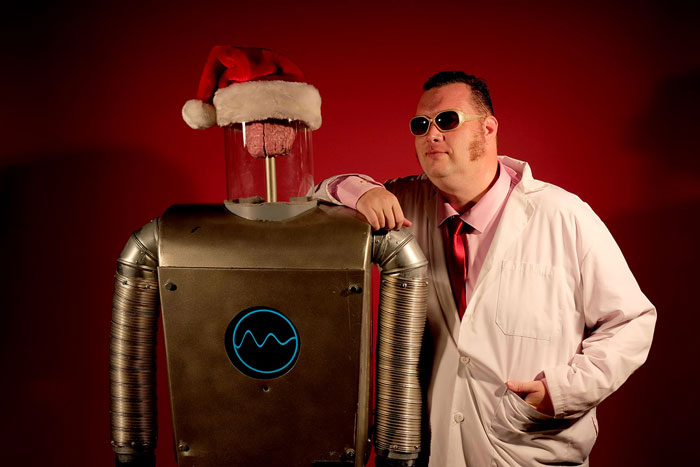
Q9 – A recent report says around 100,000 new tracks are being uploaded to Spotify every single day. How does that affect the music industry? And how does it make you feel as an artist?
A9 – We aren’t singlehandedly responsible for those 100,000 new tracks every day, but definitely a chunk of them.
I think there are some great reasons for that happening. First, recording music is more accessible. 20 years ago, you’d need a budget of tens of thousands of dollars to end up with a high quality album recorded in a studio, and that’s just not the case anymore. Our band certainly wouldn’t exist in this form if it meant spending that kind of money on every release.
Second, the distribution playing field has leveled considerably. Before the internet, if your song wasn’t on the radio and your album wasn’t in record stores, you didn’t really exist. How would anyone even hear you? Now you can upload your songs to any number of websites or services and find fans across the globe that connect with what you are doing.
Making art and music is a wonderful creative outlet, and it’s great that so many people are out there getting to do it.
Is it bad for the music industry? Probably. They certainly don’t have the kind of control over it that they used to, and as a result, it’s harder for them to make money from it. The old models don’t really apply, and they are going to have to adapt to survive. The product used to be a physical copy of the music, and bands have had to shift to becoming lifestyle brands.
Within the music industry, having that sheer volume of new music released every day also gives even more importance to publications like yours where an audience relies on a person to help curate that vast catalog and point them in the direction of what is worth their time. Finding those people that share a similar taste with you is more important than ever.
Personally, I’m less interested in music as an industry, and much more interested in music as an art form. And on that front, we are in a golden age. When I was young and my music tastes were being formed, the types of music I was being exposed to were very limited… whatever was on the radio and MTV. And everyone I knew had been exposed to the same thing. If I wanted to check out a band that wasn’t on the airwaves, I had to risk the price of an album, and had no idea what I was about to hear. And that was assuming my local record store had it in stock. Nowadays as a musician, you can follow your interests instantly and endlessly. It makes me wonder what the next generation of musicians will sound like, and what influences they will choose for themselves now that they aren’t being dictated by mainstream outlets.
Q10 – What are the future plans of Satanic Puppeteer Orchestra for 2023?
A10 – As previously mentioned, themed albums 9 and 10 are slated for release next year. In addition, we did a split 12” with Smoke and Mirrors Sound System where each band does two songs, and then there are dub versions of each of those songs. We are currently writing and recording themed albums 11 and 12, but I’m not sure if those will make it out next year.
Q11 - If you get the chance to play your music for your musical idol someday; who would be that person? Which Satanic Puppeteer Orchestra song you'd play first? And why that particular song?
A11 – In the unusual and novelty music world our band fits in, there is no bigger celebrity than Dr. Demento. He’s probably best known for helping break “Weird Al” Yankovic, but he’s been doing a radio show since the 1970s. A few years ago, we actually did reach out to him to see if he would be interested in writing liner notes for one of our albums, and he wrote back immediately and was into it. You can read his take on our band on the back of themed album #3, “Conjure the Paranormal.” So dreams do come true. The lesson there, which has served me well over the years, is never be afraid to ask. You never know how it might play out.
Q12 – Where would you like to see Satanic Puppeteer Orchestra in ten years?
A12 – In ten years, I’d like to see Satanic Puppeteer Orchestra still be active. With art, I don’t think it’s wise to measure success by followers or clicks or even sales. If there’s an audience for what I’m doing, great. That’ll afford me new opportunities and an ability to do things at a larger scale. But I’m doing it for myself. It’s a need. A compulsion. It’s an idea that’s trapped in my head and I need to get it out. My hope would that this band could continue to serve as my creative outlet, and that it’s still fun and rewarding and interesting.
Satanic Puppeteer Orchestra, Smartest Way to Fill Your Moat (Official Music Video)
Q13 - Why do you think independent artists and bands usually don’t get their investments back? Is it impossible?
A13 – If you are starting a band to get rich, best of luck to you. The only people I know that make a living doing it tour relentlessly, and even that is getting harder and harder. And a lot of those people are in multiple bands, too.
If we are talking about monetary investments, our albums are self-financed and self-released, and I’d say more often than not we actually do make our money back… at least the actual out-of-pocket production costs, not accounting for our time and things like that. I think that scarcity also helps drive demand which works in our favor. Plus we don’t have a label or a manager taking a cut, and the robot doesn’t get paid either.
But if we are talking about investment in a broader sense, I absolutely think independent artists get a return. There are practical life skills you acquire that you might not have otherwise… being in a band isn’t just about making music. There’s so much to learn… artwork, marketing, promotion, merchandising, video production, project management, budgeting, negotiation, interpersonal relationships, problem solving, all kinds of software, and so on. Through your time in an independent band, you are going to be exposed to all of these things and will likely find a career using those acquired skills. The lucky few do find work within the music industry even after their band breaks up… session musician, booking agent, producer, engineer, music teacher, music journalist, and so forth.
And that is only covering the tangible, practical aspects of it. I don’t know how to quantify the friendships you make, the community you become a part of, the rewarding feeling of creating a piece of art and sharing it with the world and finding like-minded people out there that get it. I definitely am getting something back for all the time and money I invest in the band.
Q14 - What makes a band/artist "great"? What was the first artist/band that taught you something, and what did you learn?
A14 – I don’t know that “great” is objective or something that could be defined in terms of music. Stuff that I think is great, you might loathe. Maybe even for the same reasons. Some people are lyrics first and the music production doesn’t really matter. Some people couldn’t tell you the lyrics to their favorite band’s songs. But that’s kind of what makes art so interesting, that it’s not just what the artist or musician does, but what happens when that is combined with what their audience brings to the experience, and that intersection is where the magic is.
Anyway, Huey Lewis and the News once taught me that it’s hip to be square. And judging by the shape of our vocalist, we are about as hip as it gets.
Q15 - What do you think about bands who perform with backing tracks? Do you see it as "cheating"?
A15 – I play in a band with a robot singer, so I lost any chance I had at being a music purist long ago.
If backing tracks provide a way for a band to put on a better show, I’m all for it. Of course I appreciate when bands find ways to perform all the tracks live. But I also understand it isn’t always possible. For me, concerts are more about bringing people together for a shared experience and having fun than they are about where what sound is coming out of which device.
I think maybe part of the issue with backing tracks is when there’s a sense of dishonesty tied to it. Like they are trying to be sneaky about using backing tracks and tricking the audience into thinking it’s all being performed live. I can understand the problem there. I think that’s where you see some of the backlash when a singer is lip synching. But when I’m at a show and I start hearing a string section, and there isn’t an orchestra on stage, I don’t feel like I’m being deceived. As long as bands are up front about it, I don’t see it as cheating at all. It’s just another tool they can use.
I find the topic of authenticity within art to be an interesting one. Where do you draw the line? What about Autotune? In some ways, our robot singer is just what happens when you take that technology all the way to its illogical conclusion. Is it OK for a band to use VSTs instead of the original instrument? Can guitar players use virtual pedalboards and amps? Programmed MIDI vs. performed MIDI? MIDI vs. WAV? Digital vs. analog tape? Does it matter? Why does it matter? If I connect with the music being made, the rest is sort of irrelevant.
Q16 - What would be your piece of advice for someone who wants to form a band and start a career in music?
A16 – Do it. Follow your interests and curiosity and see where it takes you.
Q17 - Lastly, what would you like to say to our readers?
A17 – Thanks for making it all the way to the very end. I’m impressed! And long-winded! If you want to check out our band, I’d greatly appreciate it. We are pretty polarizing, but if it happens to be your thing, you are in luck. We have an extensive back catalog! If you know of any cool metal bands you think we should check out, come find us on Instagram and hit me up.
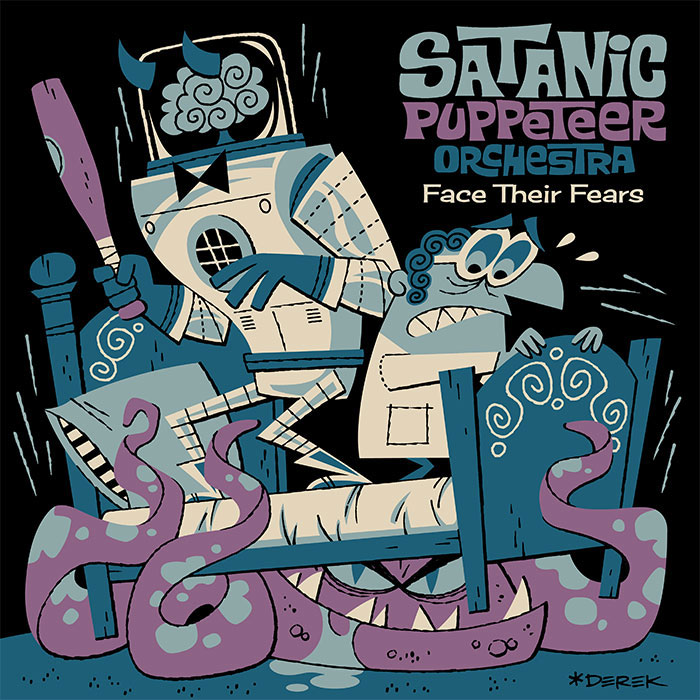
Listen to “Satanic Puppeteer Orchestra, Face Their Fears (2022)” on Spotify
Satanic Puppeteer Orchestra on the WEB
Official Website
Facebook
Instagram
Youtube
Spotify
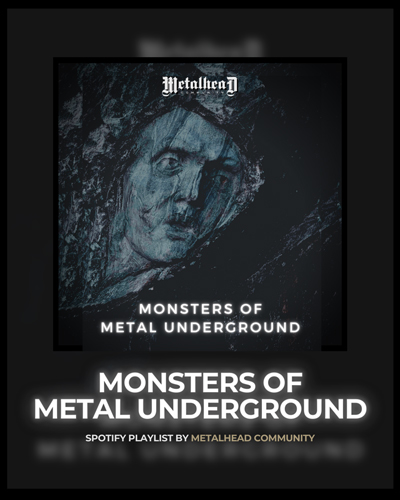
Listen to Metalhead Community's Monsters of Metal Underground playlist on Spotify

